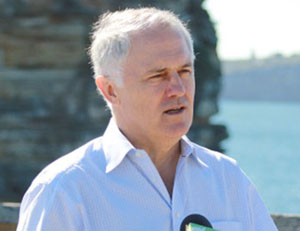Filter dead, buried and cremated: Libs

Liberal MPs Malcolm Turnbull and Paul Fletcher flayed Labor's mandatory internet filter project at an anti-filter forum held by the former opposition leader on Saturday in Sydney, where not a single voice was heard to praise the controversial policy.

Malcolm Turnbull (Credit: Malcolm Turnbull's Office)
"It's dead, buried and cremated, and if it shows any signs of revival it will then be exorcised," a jovial Turnbull told the crowd.
The news comes as last week Shadow Treasurer Joe Hockey revealed the Coalition would vote against the filter legislation if it was introduced into parliament and would not introduce a mandatory internet service provider level filter if elected. The move is likely to torpedo the filter project, as long as the Greens hold the balance of power in the Senate after the election, as they are expected to.
Turnbull said the idea "should have been put down long ago" and was a bad idea as a matter of principle in terms of civil liberties, as well as from a technological point of view. "It was simply not workable," he said. "It was a really bad idea that could only have come up from people that didn't actually understand the internet."
The MP pointed out that when the parliament's own Cyber-Safety Committee reached out to the community, including parents, to investigate whether it wanted a filter, the community said no. This led to the question of where the demand for the filter project could be coming from.
"You wonder whether the concern is coming from people that don't use the internet at all, but in fact are a little bit concerned about it as a phenomenon — uncomfortable with it as a phenomenon," he said.
Fletcher said he suspected that industry scepticism about the filter had been fuelled by the "deeply simplistic way" in which Communications Minister Stephen Conroy had promoted the filter. "Let me remind you of his famous statement in late 2007," said Fletcher, noting that at that point Conroy was presumably feeling "slightly intoxicated by the joy of having just got into government".
"He said if people equate freedom of speech with watching child pornography, then the Rudd Labor Government is going to disagree," said Fletcher. "It is hard to think of a more fatuous statement of public policy in the past three years."
Other speakers at the event — former BigPond chief Justin Milne and Simon Sheikh, national director of political advocacy group GetUp! — also slammed the filter, and the idea was widely pilloried by members of the around 100-strong audience as well.
Milne initially described the filter project in philosophical terms, arguing that every time censorship had entered human history, it had led to dark periods of violence due to a lack of information, and that sharing information itself was actually a key to humanity's dominance as a species. The former BigPond chief also argued against the filter on technical grounds, describing it as "a fence with holes".
Sheikh took a more international view: discussing filtering and censorship with relation to oppressive regimes in Iran, for example.